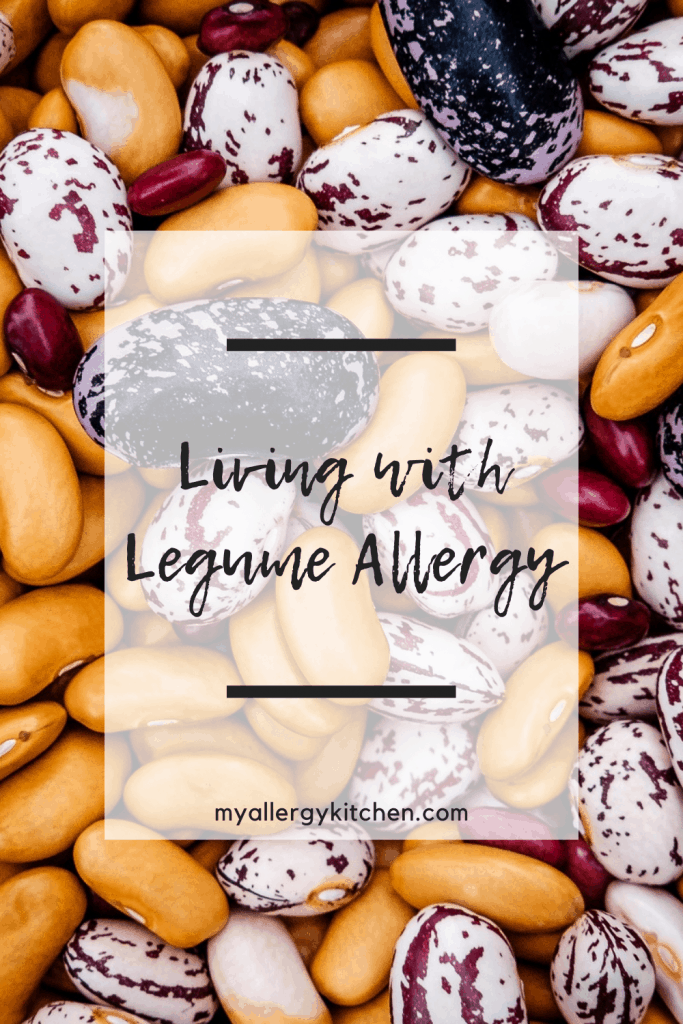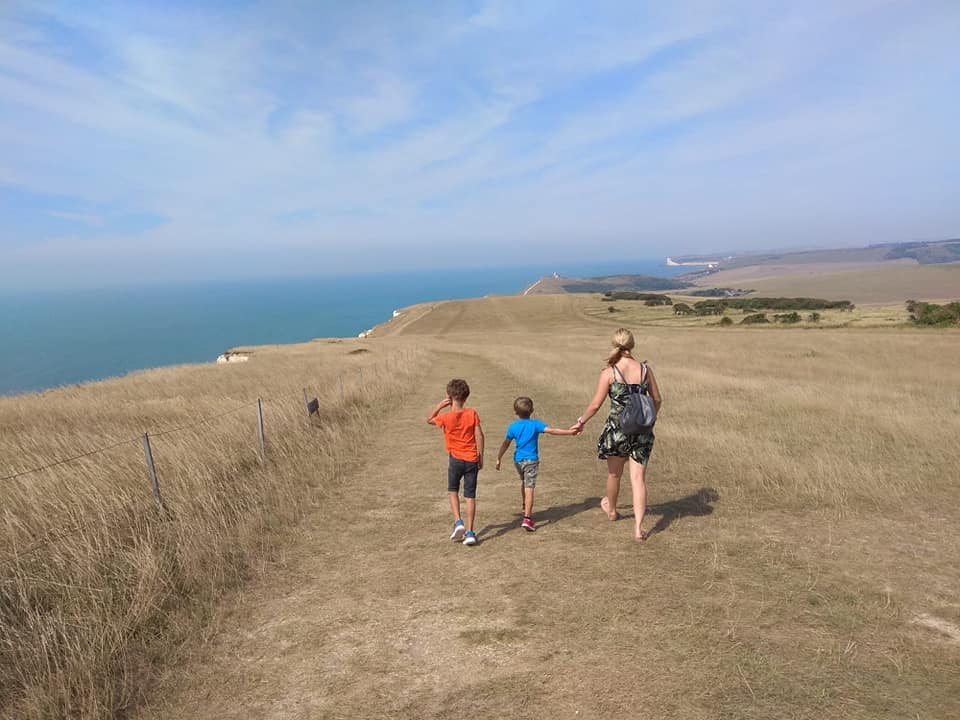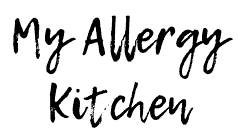In this guest post, Donna shares her experiences of her son's allergies: nuts, peanuts and legumes. She contrasts the difference between how people deal with well-known allergies like nuts and peanuts, and how they react to a legume allergy. She also discusses the difficulties involved in managing an allergy outside the Top 14. This is something we have experienced in the My Allergy Kitchen household as well (read our story here).

Becoming An Allergy Parent
Peanut butter was just about my favourite food! I ate it on toast for breakfast most days, but it was also one of my favourite snacks. I was so excited to introduce it to my son Theo when he was nearly seven months old, having started introducing purées at six months as recommended.
That adventure didn’t go quite to plan. I was surprised he initially rejected it, and was then shocked to see his lip swelling after just one bite, and he became covered in hives. I took him to the doctors where they prescribed antihistamine and sent us to the hospital that afternoon for him to have blood tests, which came back a few weeks later confirming allergies to peanut and almond. We were advised to avoid all nuts.
I had eaten peanut butter throughout breastfeeding, as well as having both peanuts and nuts in my diet. In hindsight, our baby son had suffered from very irritated skin. At the time, doctors, had written this off as baby acne or milia. But I now believe it was a reaction to his allergens, in the form of eczema and hives. Neither my husband or I have any food allergies, and they don’t run in our family, only mild hay fever, so we hadn’t expected this. Until our first paediatric appointment three months later, we didn't have EpiPens, and we avoided peanuts, nuts and ‘may contains’. It was fairly easy as I was still on maternity leave with him, so nobody else had to feed him!
At that time I discovered support groups on Facebook for parents of children with peanut and nut allergies, and I remember thinking ‘some of these children have so many allergies, I don’t know how their parents manage’.
Allergens Outside the ‘Top 14’
Our little boy was 15 months old when he started reacting to other foods. Firstly, I couldn’t put my finger on it. He sometimes vomited at nursery tea-time, and we’d have to have 48 hours off childcare (and work) although he didn’t seem ill with any kind of bug. Then he reacted to beans on toast at home one day, which he’d eaten before without any trouble; then to a Marks and Spencers toddler ready-meal, which I’d scoured for nut warnings and found nothing related (turns out, it contained peas). Theo was reacting to other legumes – the food group to which peanuts belong – with vomiting, hives, and sometimes swelling to the eye area. We went back to the allergy clinic, and had pea, bean, chickpea and lentil confirmed by IgE bloods.
It’s very different working with food allergens outside of the top 14 that manufacturers and restaurants have to list. Nursery and school were ‘nut free’ and therefore school dinners are free of those allergens. But the legume allergies meant a submission to the County Council to generate a ‘special diet’ for him to exclude the other foods hidden in different meals. He’s had hive reactions to traces of pea on the assembly floor after other kids have eaten them for lunch. When people joke about food fights I cringe. I know a rogue pea could cause my son a nasty allergic reaction, even anaphylaxis.
We do go on well-researched holidays and we eat out in pubs and restaurants but we choose carefully. Explaining allergies to what most people consider safe, everyday foods like peas and beans sometimes result in some funny looks. These foods just aren’t accepted as life-threatening allergens in the same way peanuts and nuts are. People definitely take them less seriously, but that’s understandable as they are less common and therefore many people haven’t heard of them. I think as we have become more confident in explaining ourselves, the way people respond has changed too.

Using EpiPens
We have always lived by the rule that previous reactions are not a sign of those that might happen in the future. We never leave the house without two EpiPens, and are very vigilant when it comes to food. So far, we have had two instances where we’ve had to use adrenaline. The first was when he was five years old at a children’s party, where we can only think it must have been cross-contamination despite everything having been checked by the caterer; and the next time at home, the second time he tried green beans. We have been ‘lucky’ because the reactions weren’t particularly dramatic, but as his throat was affected we used them as per all the medical advice we’ve been given.
Before we had ever used the EpiPen, we worried about what it would be like – whether it would hurt him, whether we would know what to do in an emergency, if he would panic and of course if it would work. Since having used it, I consider it such a wonderful tool to have on us. It was actually far more straightforward and far less traumatic than we, and he, imagined.
Anxieties
At the moment, our son accepts his allergies as part of who he is. He is confident in speaking up and explaining that he can’t have something and why. There are other children in his class at school who have one or more allergies. As a result, their generation are much more knowledgeable and understanding than ours. I don’t recall ever knowing anyone with an allergy when I was at school – ‘last century’ as my children will remind me!
His younger brother has no sign of having any food allergies. So we do have experience of both sides of the coin. Taking him to a party, for example, is so different because we don’t even have to think about what he is eating. There is definitely less ‘helicopter-parenting’ in that respect.
I do worry about the time when he will become more independent and want to go out without us. He'll have to take on the responsibility of carrying his own EpiPens and checking labels himself, or worse still, assessing whether or not he wants to risk eating something. I’ll have to trust him to make the right choices. I suppose this is something every parent has to come to terms with, albeit not always about something as seemingly harmless as legumes.

Donna.
I live in Hampshire, UK with my husband and two sons who are at primary school. One with multiple legume and nut allergies, and one who’s allergy-free. I work part-time as an HR Manager. In my spare time I run the Legume Allergy Guide and support groups.
- Blog: www.legumeallergy.co.uk
- Facebook: facebook.com/nutallergymum/
- Twitter: www.twitter.com/nutallergymum
- Instagram: www.instagram.com/nutlegume


Lucy
The legume allergy sucks. Especially cause if they’re not using soy protein they use pea. I also feel like everything contain chickpea flour all of a sudden. I’m one of the unfortunate who reacts to carob bean powder ( in icecream, and cream cheese) and even soy oil. I’m living in the states presently and they use soy oil in EVERYTHING. My allergy list is insane. All fruit, most vegetables, all nuts, legumes, white potatoes ( potatoes starch is another in everything sauce mixes, gf things, shredded cheese.)
It often feels not fair, which sound childish, but sometimes you just want to be able to eat like a “normal” person.
Although your Son might luck out and grow out of his allergy during puberty. I gain allergies during big hormonal changes. I gained my pea one during my pregnancy with my son most my other began when I entered puberty.